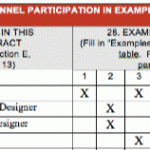
I was in a bit of a bind.
I had not even started to work on the presentation that I would be giving in front of my class the next morning. And here I was at the annual bikini contest at one of our college’s dive bars (literally, the saddest place for a single college guy like me to be).
And the worst thing was, I could not even pronounce the topic I was to speak on. What the heck is differentiation? For all I knew, it was something you could catch from one of the frumpy coeds stumbling on stage. What the heck was I going to do?
I turned to look at my classmate, and presentation partner, whose brilliant idea this excursion was. Next to him, I looked like Stephen Hawkins. His assumption was I would put this presentation together and save the day (or at least help us squeak by).
Suddenly, the perfect presentation idea washed over me like the vomit of a misguided bikini contestant who just polished off a chili dog and 9 jello shots.
That was my introduction to differentiation. It’s a word that everybody just assumes they understand. But it is probably one of the most misunderstood concepts in the business world. Truth be told, it took me years to truly grasp it. And even today, when I try to explain it to seasoned professionals, they look at me with blank stares. So, let me explain what differentiation in marketing is and what it isn’t.
What Does Differentiation Mean?
My hastily thrown together presentation had it right, sort of. The next morning, my presentation, “Bikini Contest Differentiation Theory” was a hit with the class. Even though I mispronounced the word differently each time I said it.
The whole concept was this. Let’s face it, college girls that enter themselves in bikini contests (at that very specific moment in their life) fit a certain demographic. I’ll be frank, they weren’t winning any traditional beauty contests. They were all just average girls looking for a little attention from an audience of guys even they would normally not give the time of day to.
No one girl would stand out as being dramatically more attractive than the next. And each girl would be judged by the amount of applause they could generate from this crowd of sad college losers like me.
So, how do you win in that situation? Differentiation.
At this point, you probably know where I’m going with this. You don’t win a bikini contest by being “better” than the other girls. You win by doing two things:
- Being different
- Giving the audience what they want
You Can’t Differentiate Without Being Different
I find this to be the biggest misconception. But look at the freaking word…differentiation.
> Different -iation
If the key term there doesn’t slap you in the face, I don’t know what will. Yet, people seem to always see this:
> Better -iation
That’s not the term. Differentiation is not fundamentally about being better. It is fundamentally about being different.
Yet, people still consider these differentiators:
- Our architects are LEED certified.
- We work on many on-call contracts
- Our project manager has 30 years of experience
- We have superior customer service
Those things describe why you are just like everybody else. They don’t describe why you are different. There is nothing different about them.
“But Matt, their project manager only has 25 years of experience!”
I’m not seeing the substantial difference. Let’s be real.
Going back to the bikini contest, how could a girl differentiate herself? Well, one came out with what would be described today as a Borat-style bikini. Ultimately, did it show more skin than any other bikini? I have no idea. But it showed skin in different places than a traditional bikini. And just that little difference sent the crowd of lonely dorks into a frenzy.
By the very definition, you cannot differentiate without being measurably different. To think, even for a second, that you can is to have a fundamental misunderstanding about the term.
The Second Part Of This
There is also another key element of differentiation that I believe many people fail to consider. In fact, it was something that my presentation failed to grasp. The difference has to be something the audience wants.
Let’s go back again to the bikini contest example. A girl could have came out with some fantastic glittering shoes. That would have been different. But being different, in itself, is not enough to differentiate yourself. That’s because the audience in a bikini contest doesn’t care about your shoes.
In contrast, if a girl comes out and immediately throws off her bikini top…that’s differentiation because (stated or unstated) that’s what the audience ultimately wishes for.
However, if the next 10 girls see that and proceed to throw off their tops as they walk out…it’s no longer a differentiator. Both elements have to be in place:
- Being different
- Giving the audience what they want.
The concept of “what the audience wants” is very easy when talking about a bikini contest. I chose to use this cruder than usual example so the point was clear and easy to grasp. What won’t always be so clear is what your audience truly wants. Getting that information, at times, can be difficult…but not impossible.
If you have learned anything from this rant about differentiation, let it be this. Bikini contests are fundamentally creepy. But they are easy to win if you understand differentiation.
If you liked this article, please subscribe below or on the right side of the homepage. If you want to give us your thoughts on this issue, please leave a comment below.





Hi Matt,
While your article is actually timely for us right now, and it was easily understood, I truly wish you could have come up with a better analogy. I don’t even feel comfortable sending this out to my studio. As a woman, sending this to a studio with both male and female members, I just don’t want even the slightest chance of any misinterpretation, and I don’t wish to have people all struck with the image of bikini clad drunk and vomiting college girls (of, according to you, questionable self esteem).
With three college age girls of my own, I’m disgusted and terrified all at the same time. Thanks for that morning image.
I love your content, as do others in my studio. But as relevant and good as this one is on its point alone, I can’t even share.
Please consider using less vulgar and chauvinistic analogies in the future.
Thanks so much.
Sandi, Good points. I didn’t mean to be chauvinistic. If you look at the article, I am equally, if not more, condemning of the males in the audience. I also make the comment that these contests are fundamentally creepy. There is no way you could make the argument that this article is, in any way, “pro” bikini contests.
In any moment in time, adults (which college students are) have to make their own choices. In my case, I couldn’t have been making a more terrible choice. But that doesn’t mean I, or the girls who participated, would make the same choice today. Nobody should be defined by a single good or bad decision they make (murder might be the exception).
Whatever good or bad decisions our kids make, they’ll likely survive and we will continue to love them unconditionally.
This was an easy read with clear concepts, plus the perfect does of comic relief. Thanks Matt.
Thanks Jen!! Glad you got it.
Glad to say, I’ve never attended a bikini contest. But your description is spot on, and we’re not likely to forget it!
Thanks for the comment. To be honest, I did wonder if I should push “publish” on this one. But I don’t want to needlessly censor myself if I can make a strong point.
I love the ‘being different’ aspect of marketing, that being said I’m finding it harder and harder to understand what being different means. So many new trends and ideas come into play in marketing but ever so quickly fizzle out too!